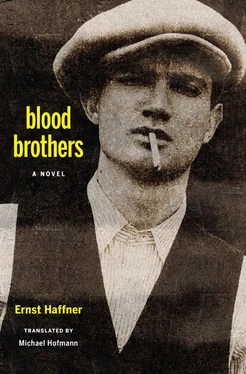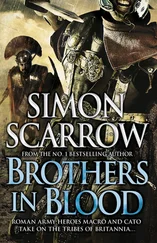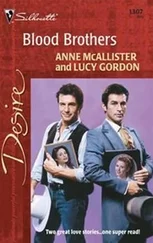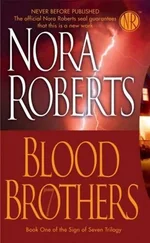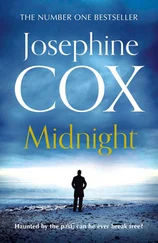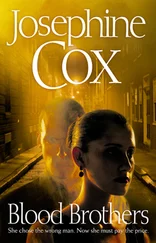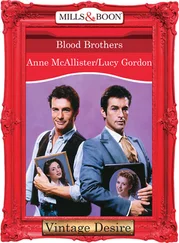Through an air vent Ludwig hears the surging noise of the Alexanderplatz, the clattering of heels, the oaths of irate drivers, the giggling of gossipy secretaries, and the repeated incomprehensible cries of the newspaper sellers. He can feel his heart beating at his throat, his hands are trembling and slick with sweat. He’s almost there, almost. He casts a look at the officials across the partition from him. Calm decent men, sitting at their desks, working through files, files, files. Prison is their career, locking people away is their vocation. They get as much pleasure out of shutting someone up as letting them go again. In or out, what’s it to them, they only do what the files tell them.
A little man comes running into the office. Short stout legs in falling-down puttees, his rotund belly in a warm tunic. The jolly red face with the never-still pince-nez looks just about as unpolice-like as it’s possible to be. He presents his papers, which identify him as the transporter of the young offender Ludwig N. Everything is in order, he is presented with the large file, and then he has to sign for it and the associated offender. So far as Berlin is concerned, Ludwig has been dealt with. He is released from the pen, and handed over to the transporter. The fat man gives the boy the onceover. “Well, let’s get going, then, shall we. Morning, gents.” He stops down in the yard of the HQ. “Now, listen to me, Ludwig. My name’s Hackelberg, it’s my job to take you to the institution at H. We’re going to take the underground to Potsdamer Platz, and then we’ll walk to Anhalter Bahnhof. I’m supposed to have you on a lead while we’re in Berlin” — he shows Ludwig a chain — “but that’s not a nice thing for either of us, is it. So be a sensible lad, and don’t get any ideas. If you try and make a break for it at any point, I’ll have no option but to have you cuffed. Are we agreed then?” Ludwig answers “Yes, sir” like a good boy, and looks longingly at the cigar Herr Hackelberg is about to light. “Fancy a smoke, do you? Well, let’s see if we can’t buy a couple of cigarettes somewhere,” is the transporter’s reaction to Ludwig’s sheep’s eyes.
And now they are walking through the crowds. Herr Hackelberg, seemingly without a care in the world, is drawing on his cigar and giving Ludwig instructions as to his behavior once they are on the train. Ludwig feels the paving stones under his feet, he feels light-headed like an invalid who’s been bedridden for months. All those people, those shops, Tietz’s over there, the girls … my God, the girls. They’ve made it to the underground stop in no time, now they go downstairs. Herr Hackelberg buys ten cigarettes at the kiosk. “There you go, Ludwig, now you can puff away to your heart’s content …” Ludwig barely manages to blurt out his “Thank’ee.” Someone being kind to him, giving him cigarettes? It defies belief. Hackelberg is offering him a light before he’s dared to open the pack. Then he bursts out with it: “Thank you … oh, thank you so much, Herr Hackelberg. No one’s shown me any kindness for such a long time …” How long is it since he last smoked? The last cigarettes he had were the ones Jonny sent. He gulps, swallows the smoke and blows it out in dense clouds.
Now here’s their train. In spite of the crowd, Herr Hackelberg is adept at keeping Ludwig at his side at all times. He’s also given him his file and his little suitcase to carry. The boy would have to fling those away if he made a dash for it, and by the time he does I’ll have got him again, he thinks. They have to change at Friedrichstadt. The crowds in these underground-transfer stations are something to behold. Everyone walking, running, jogging into each other and past each other. Your Berliner hates to miss a train. That would mean having to wait two minutes till the next one! Even a jobless man will leap aboard a moving train. It must be an old instinct, dating back to the time he was still gainfully employed …
Ludwig, with case and file, twists his way through the crowds. By his side is the alert Hackelberg. They have to go down a long passage called Consumption Corridor. Two young men are barging their way through the other passengers, to catch the train pulling in at the far end of the passage. “For Chrissakes, get a move on, won’t you! Get on with it,” calls one, then they disappear into the mass. “For Chrissakes get a move on.” The words echo in Ludwig, bring him to life: git on wiv it! He can feel it whispering to him, exhorting him: run, break, do one! He’s forgotten his earlier gratitude for the ten cigarettes. A new feeling, his hunger for freedom, swills away all that.
Crash! The case and file are down at Herr Hackelberg’s feet, impeding him. Ludwig clears a path for himself with fists and elbows, races down the steps into the tunnel. Parts the human seas with both arms, squeezes, twists, forces himself through every little gap, hugs the wall, where there’s liable to be the most space. No one is surprised at the boy’s hurry, they’re just furious at the way he’s knocked them aside and trodden on their shoes. Ludwig can hear a roaring inside him: For Chrissakes, get a move on … run … or else he’ll catch you! At the same time, he’s thinking urgently: where to? If there’s a train at the platform, jump on board. Otherwise, up to street level and onto a passing bus. The platform. A train is just pulling out, it’s already putting on speed. Pull at the door, run alongside … jump! Helping hands pull him into the carriage. Panting hard, he stands among the passengers. The train races west. If a ticket inspector happens by, Ludwig, you’re out of luck.
What about Herr Hackelberg? He did his best. Left everything lying there, set off in pursuit and yelled his “Stop! Stop!” It was his bad luck that a train was just leaving. The stationmaster assumed his “Stop!” was for the train, and thought Herr Hackelberg meant to jump onto it. As duty obliged him, he held him back. Held on to him. And before Herr Hackelberg, distressed as one may imagine, was able to explain the situation to him, Ludwig was gone. Only the case and file could still be retrieved. So back to HQ. He wasn’t to blame for any of it. It said expressly on the transport papers: Cuffing not essential.
Ludwig rides for three stops. Then he transfers to another line. Changes again. Always stands by the door so that, if an inspector should come, he can get out right away. What now? Back to the gang! You don’t stand a chance alone in Berlin. He doesn’t have a penny. He won’t risk the vicinity of Münzstrasse, where the Blood Brothers hang out, not so close to police HQ. But how is he to contact Jonny or one of the others? He could try calling Schmidt’s, at this time of day there’s bound to be a Brother there. But then he doesn’t have a coin for the phone! The train is really flying now. Ludwig can’t even make out the names of the stations. Where’s he going to get a coin from? On the opposite seat is a thrown-away paper from today. New, barely looks opened. Ludwig picks it up. The twelve o’clock edition of the B. Z. He has an idea. The train is stopping, not before time. Gesundbrunnen station. He quickly gets out. Climbs up to Brunnenstrasse. Heads in the direction of Badstrasse. Looks at the clock, at the newspaper kiosks. No, it’s not here yet. Up here, in the far north of Berlin, it doesn’t usually get here before half past twelve.
Once again, Ludwig takes a look around in all directions. Policemen? Nope. He chances it. He calls out: “ B. Z . — noon edition!” and waves the paper in front of him. He shouts four times, and then he’s shot of it, and he’s got a coin for the phone. Back to Gesundbrunnen station, to the call box. He knows the number by heart. Even before anyone says hello, he can hear the oom-pah-pah music. His face cracks in a smile. The old days at Schmidt’s. Then a voice, Jonny’s, in person. He listens. Doesn’t ask many questions. Only: where are you? And: where can we meet, I’ll grab a taxi. Ludwig suggests the Vinegar Cinema. Jonny knows. He’ll be there in no more than fifteen minutes. See ya.
Читать дальше
